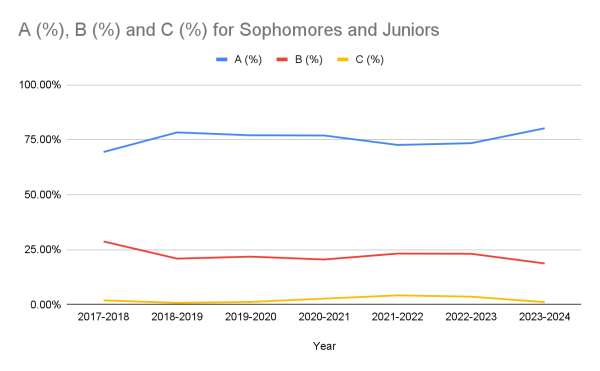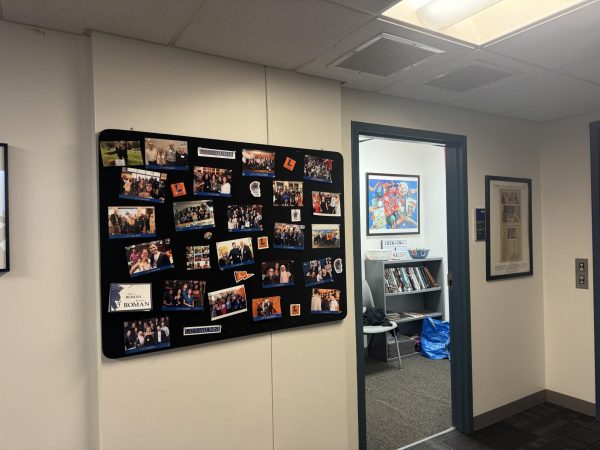Senioritis and Zoom Fatigue Reduce Motivation School-wide
Collage made by Charlie
As students return from spring break each year, “senioritis” appears in halls, classrooms, and emails. But, what is senioritis for the class of 2021? And how bad is it?
Upper School math teacher Tim Kendrick defined the word as “a lack of interest in meeting expectations to finish out classes.” Molly Lemieux, an Upper School English teacher, defined the word as “a natural transition to start looking ahead rather than staying in the moment.” Senior Maya Gray was more blunt with her definition, describing the mindset as “the realization that, basically, what you do now doesn’t really matter or have an impact on your future.”
In a virtual school environment, senioritis has developed a new meaning. Mr. Kendrick described his previous experiences with senioritis as beginning post spring break, but senior Frances Hutchison feels like her senioritis set in as soon as she turned in her last college application at the end of winter break. She credits her early onset senioritis as a repercussion of the feeling that she “wasn’t really given any external motivators.”
Maya seconded Frances’s remarks, saying, “There’s no Oprah coming to our graduation speech anymore. … I think we’re all, collectively, just over it and ready to be done and go to college.”
But, while motivation may have plummeted for the senior class, they have not completely forgotten about school. Maya joked, “We all know that I’m still going to be doing my 50 pages of reading every night,” and Mr. Kendrick commented that his AP statistics class has a “much lower degree of senioritis than other senior classes.”
Ms. Lemieux also noticed how COVID has reshaped the image of senioritis, saying, “It’s easier on a synchronous class to not pay attention, to be on your phone or doing other things on your computer, but it doesn’t have the same quality of students just wanting to talk to their friends in class.” She added, “To be honest, I missed that. It’s hard to goof around now.”
Mr. Kendrick expressed similar feelings, saying, “It visually presents itself in the classroom with a more relaxed atmosphere. You can just see it,” and “it’s been much harder to see it so far.”
But the lack of motivation this spring does not seem to be limited to the senior class. Junior Isabel Gortner said, “There are certain points of motivation and excitement to do work. But as a general trend, I feel like I have just been trying to minimize the amount of time that I spend doing work.”
Upper School English teacher Shannon Barker said she sees “burnout and exhaustion in all grades,” but also people “motivating through those feelings.” And students are not alone in their fatigue.
Jenny Stevens, an Upper School counselor, said, “Zoom fatigue is real. And it’s something that everybody in our community has experienced,” and Ms. Barker commented, “I also feel those symptoms myself after the last year.”
When asked if there is a cure to senioritis, Maya was quick to respond. “I don’t think you stop senioritis. I think it is what it is.” Frances’s suggestion to her fellow seniors is to “find something that you really, really enjoy doing.”
From a teacher’s perspective, Mr. Kendrick said he addresses potential senioritis by “pivoting away from creating opportunities for bad choices and trying to find ways to change the classroom dynamic,” adding, “I try to make it a lot less traditional school-y and hopefully more engaging and fun.”
Ms. Lemieux has a similar strategy, explaining, “I try to cut them a little slack.” She added, “I personally don’t view senioritis as a negative thing, so I try to structure my class in a way that we can do fun things in the spring.”
For students outside the senior class feeling a lack of motivation, Isabel shared that she has tried to encourage self-motivation by meditation and walking outside, but that her key is “being gentle with yourself and having some self-compassion.”
And while Mr. Kendrick said that “to some degree I understand and respect the end of the high school career,” he emphasized his desire for students to return to in-person classes, saying he “really hopes that if it is a possibility for you to safely be in these full days of school in May, to return and engage in your final weeks of school.”
Ms. Stevens seconded his remark, saying, “I absolutely agree with him. It is close to impossible to replace human interaction and human proximity. The belief that we connect similarly on Zoom and through the computer is just … I don’t believe that.”
At the end of the day, there are only five weeks left in the school year. Ms. Stevens pointed out, “I had it and everybody had it. Senioritis has been around for ages,” and as Ms. Lemieux said, “Senioritis is a natural progression. It’s a rite of passage.”

Charlie Williams (‘22) is very excited to contribute to The Forum as a Sports Editor. She has written for The Forum since the beginning...
























































